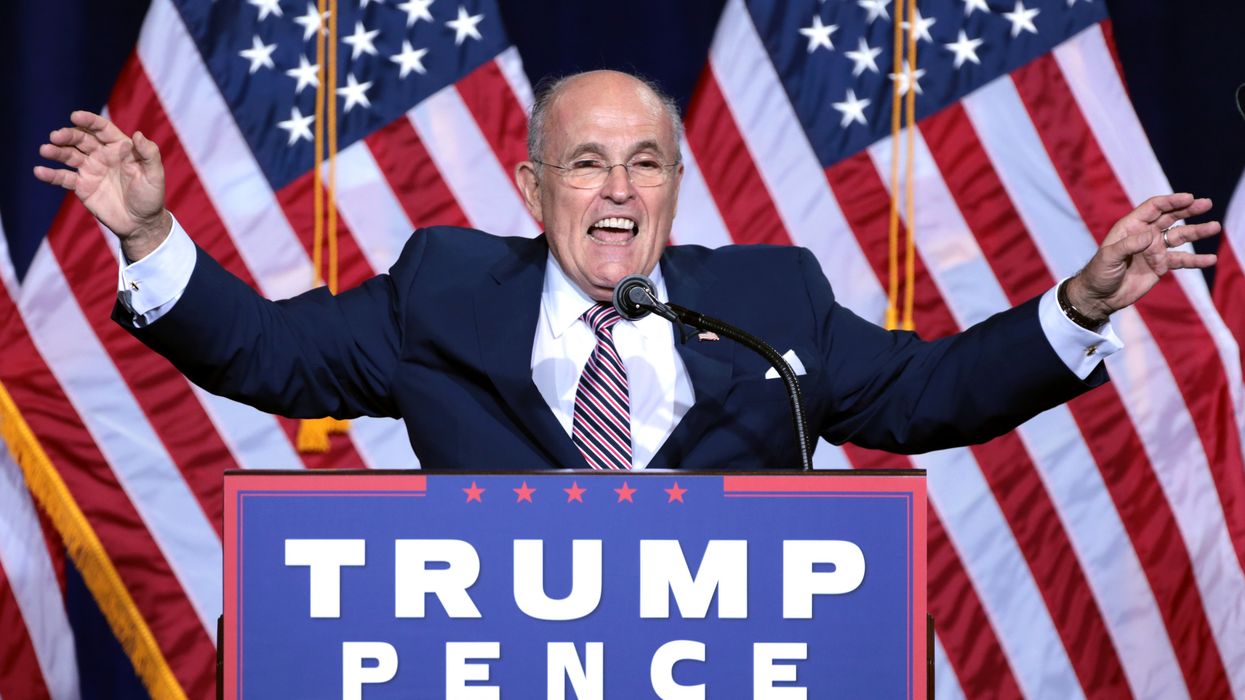Former Donald Trump attorney Giuliani's decision not to testify in his Georgia defamation trial is normal, according to CNN legal expert Elliott Williams.
CBS reports the ex-New York mayor "opted not to testify earlier Thursday, even though he had told reporters a day earlier that he intended to do so."
Williams shared his thoughts with hosts Pamela Brown and Boris Sanchez Thursday on the ex-New York mayor's "about-face," saying, "It happens all the time. The idea of testifying in your own defense is frankly human. Anyone who's sued thinks 'I want to clear my name and I want tell my story.' When you get into the courtroom, it happens all the time, Boris, where either seeing the jury, hearing the judge, or the prospect of knowing that you could be confronted with your old statements, criticized or challenged on things you've said before. It's a very frightening prospect and probably the right decision for him to not take the stand."
POLL: Should Trump be allowed to hold office again?
Brown said, "Rudy Giuliani was barely paying attention. He was on his tablet. Did that feed into what the jury decides? The fact is not even showing that he cares about the closing arguments?"
Williams asked, "Should it? No. Will it? Yes. They are very two different things. Legally, a jury is not supposed to assess someone's behavior. O will be candid, even when I read it in the article I sort of rolled my eyes a bit because it's the kind of detail that's an interesting human detail, but just doesn't matter in the courtroom. Jurors are human beings and they are watching a man whose life is on the line scrolling through TikTok, or whatever it might be, And it's just a bad look. You know, you have to win these people over as much as you have to be right on the law."
Sanchez noted, "It also contrasts with what his defense attorneys have said — that he is a good man. That he didn't intend to hurt these workers. He's outside the courtroom still accusing them of fraud, baselessly, telling us to stay tuned for the evidence. He's been saying that for three years with no proof. Is that effective?"
Williams replied, "Look, a beautiful thing about our legal system is that good men and women can also defame other people. It's not a question of your personal virtue. It's a question of, 'Did you made false statements that hurt the reputations of two individuals?' That's why they are suing for this amount of money. It's not just to enrich themselves off the court. Their reputations are a thing of value that they are seeking, at least in part, to be compensated for that, and then also punish him a little bit."
READ MORE: 'Conspiracy-crazed' Rudy Giuliani is facing everything from 'financial ruin' to prison: report
Brown noted, "The defense at one point compared -- what they are asking for in terms of damages, is the civil equivalent of the death penalty. What do you make of that?"
Williams said, "That's kind of a legal term. There's the concept of a corporate death penalty when a corporation is sued for tons and tons of money. that is rhetoric from lawyers. that has potential to devastate this defendant. There's no question about that. It's a lot of money. Now, look what it meant to these individuals in terms of death threats, physical threats, online harassment and criticism they faced. Again, this comes down to their ability to run a business and conduct the affairs of their lives, which they've lost on account of the conduct, allegedly, by the defendant."
Sanchez then asked, "Quickly, Elliott, what do you make of the remarks of the attorneys for the two election workers, saying that the jury should send a message with their decision?"
He replied, "That's the whole point of punitive damages. Compensatory damages are to pay you back for something you lost. Punitive damages are to send a message and deter other people in the community in the future from doing the same thing and say that, 'Look, you might think this is just fun online chatter between friends, but it can actually really hurt people. Don't do it. We are deterring you from that."
CBS News congressional correspondent Scott MacFarlane shared via X (formerly Twitter), "Giuliani attorney (Sibley) opens closing statement by telling jury that Giuliani won't testify because 'these women have been through enough.'"
READ MORE: Here's why the New York AG considered investigating Rudy Giuliani
LA Times senior legal affairs columnist Harry Litman wrote, "Giuliani jury argument: the plaintiffs have suffered enough--that's why we made the decision not to ask any questions (of Freeman) and for Rudy not to testify. Yeah, right. But Sibley (Rudy's attorney) has basically nothing to work with. See you on @msnbc w/ @ChrisJansing soon."
Watch the video below or at this link.
Analyst explains why Giuliani’s 'about-face' on testifying was 'right decision for him'www.youtube.com


